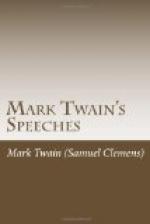Well, I like the poetry. I like all the speeches and the poetry, too. I liked Doctor Van Dyke’s poem. I wish I could return thanks in proper measure to you, gentlemen, who have spoken and violated your feelings to pay me compliments; some were merited and some you overlooked, it is true; and Colonel Harvey did slander every one of you, and put things into my mouth that I never said, never thought of at all.
And now, my wife and I, out of our single heart, return you our deepest and most grateful thanks, and—yesterday was her birthday.
TO THE WHITEFRIARS
Addressat the dinner given by the
Whitefriars club in honor of
Mr.
Clemens, London, June 20, 1899
The Whitefriars Club was founded by Dr. Samuel Johnson, and Mr. Clemens was made an honorary member in 1874. The members are representative of literary and journalistic London. The toast of “Our Guest” was proposed by Louis F. Austin, of the Illustrated London News, and in the course of some humorous remarks he referred to the vow and to the imaginary woes of the “Friars,” as the members of the club style themselves.
Mr. Chairman and brethren of the vow—in whatever the vow is; for although I have been a member of this club for five-and twenty years, I don’t know any more about what that vow is than Mr. Austin seems to. But what ever the vow is, I don’t care what it is. I have made a thousand vows.
There is no pleasure comparable to making a vow in the presence of one who appreciates that vow, in the presence of men who honor and appreciate you for making the vow, and men who admire you for making the vow.
There is only one pleasure higher than that, and that is to get outside and break the vow. A vow is always a pledge of some kind or other for the protection of your own morals and principles or somebody else’s, and generally, by the irony of fate, it is for the protection of your own morals.
Hence we have pledges that make us eschew tobacco or wine, and while you are taking the pledge there is a holy influence about that makes you feel you are reformed, and that you can never be so happy again in this world until—you get outside and take a drink.
I had forgotten that I was a member of this club—it is so long ago. But now I remember that I was here five-and-twenty years ago, and that I was then at a dinner of the Whitefriars Club, and it was in those old days when you had just made two great finds. All London was talking about nothing else than that they had found Livingstone, and that the lost Sir Roger Tichborne had been found—and they were trying him for it.
And at the dinner, Chairman (I do not know who he was)—failed to come to time. The gentleman who had been appointed to pay me the customary compliments and to introduce me forgot the compliments, and did not know what they were.




